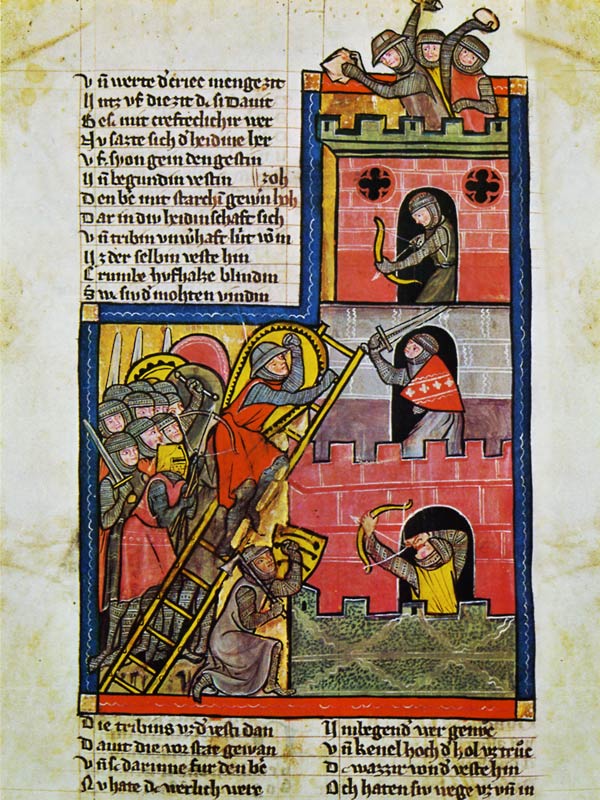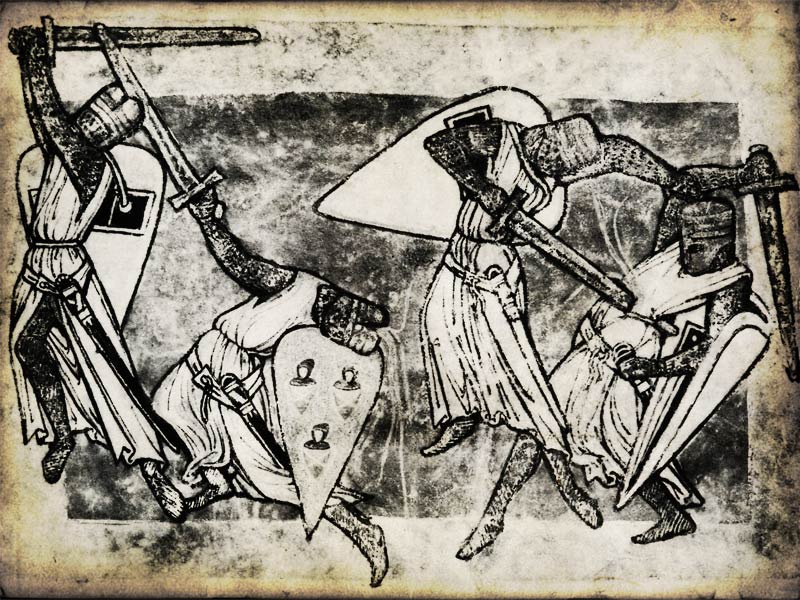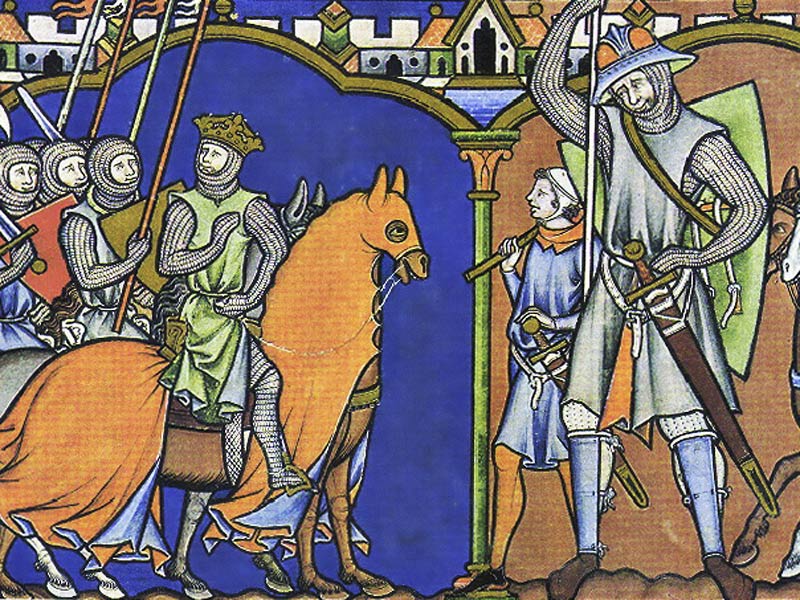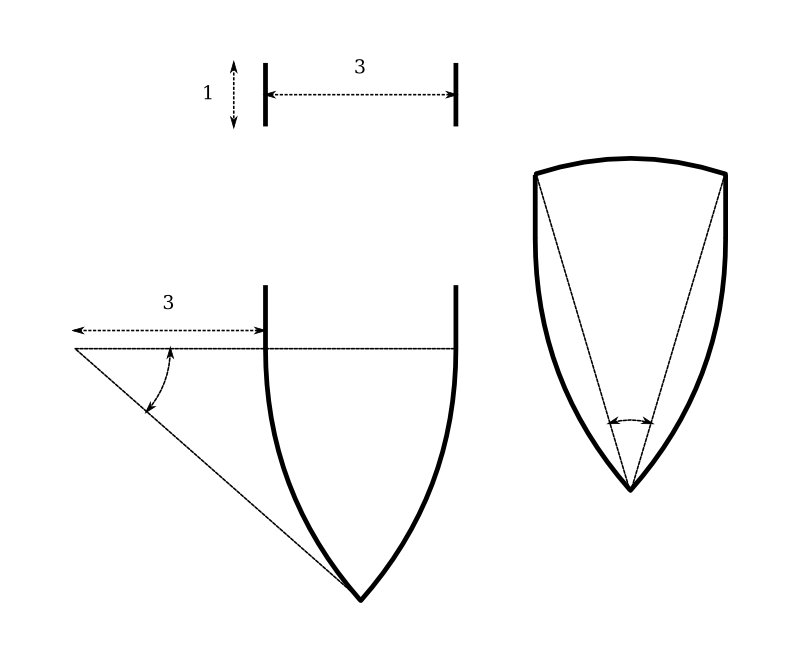Hi all,
Next weekend I am going to build a shield press/rig for making curved shield, together with a friend of mine. It will be based off this fantastic rig. That website also has a great article about making the shields themselves. Particulary useful is his guide on how to draw the outline of a heater shield.
I'm looking for something similar to draw the ouline of an early heater / flat-topped kite shield as they were used at around 1200-1250. Any ideas what dimenstions such a shield would be? Any clever way to draw them perfectly, similar to Ye Olde Gaffer's heater design?
Thanks in advance!
I can't help you with the dimensions, but I just made a heater using Gaffer's shield press. I'm really happy with how it turned out, but during construction, I noticed the center of my plywood panels did not line up with the center of the press' curved ribs, and would have resulted in an assymmetric curve. If you built the press according to the diagram, you will need to move your cleat up a few inches to compensate. I was using 2ft x 4ft quarter inch panels. Gaffer mentioned in the tutorial that he had changed the curvature radius on his plans, and I think this just slipped through the cracks. All in all, that press is awesome!
Do you have an image of the design you are planning on matching? In theory, you should be able to put a scale rule to it and figure out the relationships. In Ye Olde Gaffers" it cleverly shows it by relational units. Knowing the dimensions of your design you should be able to use a makeshift compass (like Gaffers) to draw any curves.
It is best if the image you are working with is a straight on view. Careful to take the curve of the shield into consideration.
It is best if the image you are working with is a straight on view. Careful to take the curve of the shield into consideration.
I used to fight with a flat topped kite, and I absolutely loved it. I pretty much guessed at the dimensions though.
As far as the curve goes, as long as the curvature is consistent across the press, the shield doesn't need to be aligned at any particular part of the press to have symmetrical curvature.
As far as the curve goes, as long as the curvature is consistent across the press, the shield doesn't need to be aligned at any particular part of the press to have symmetrical curvature.
| Richard Schneider wrote: |
| Do you have an image of the design you are planning on matching? In theory, you should be able to put a scale rule to it and figure out the relationships. |
I don't have any images yet, unfortunately. Which is one of the reasons for my post. I've been paging through the Maciejowski Bible but only very few infantry shields are shown, and you always view them from the side (e.g. held over the head or strapped to the back during a siege).
Hmm... I'll have a look through the "Show us you shields" thread.
I do know the maximum shield size I can produce: 61 x 122 cm. That's the standard size of plywood around here (or in multiples thereof, e.g. 244 x 122 cm).
Well, I've been having a look through various manuscripts and it seems that the length of an early infantry kite/heater shield is from knee to shoulder as apposed to cavalry which seems to be top of hip to collar-bone.
As for the width I'd assume that since with one of these shields one would fight 'side on' as it were (then again, I guess that's how one is meant to fight anyway) so maybe it doesn't need to be as wide as one would think.
I think it's depth that I'd be concerned about, as it seems that it curves around from shoulder to shoulder, and as such I'd persoanly tweak the Ye Olde Gaffer's Press to give my kite a deep curve.
It does seem to work well for moderately curved heaters though.
I may have to make one.
 Attachment: 124.2 KB
Attachment: 124.2 KB

Guys near the siege ladder.
 Attachment: 139.3 KB
Attachment: 139.3 KB

I think this is from here somewhere...
As for the width I'd assume that since with one of these shields one would fight 'side on' as it were (then again, I guess that's how one is meant to fight anyway) so maybe it doesn't need to be as wide as one would think.
I think it's depth that I'd be concerned about, as it seems that it curves around from shoulder to shoulder, and as such I'd persoanly tweak the Ye Olde Gaffer's Press to give my kite a deep curve.
It does seem to work well for moderately curved heaters though.
I may have to make one.

Guys near the siege ladder.

I think this is from here somewhere...
Thanks for those images Sam. Do you happen to know what dates they are from?
Alas, I just sort of saved them, but I think that the bottom one is from the 13th Century Germany and the top one maybe early 14th Century.
Oh, and here's one more if it helps.
 Attachment: 144.9 KB
Attachment: 144.9 KB

Goliath in the you-know-what-bible...
Oh, and here's one more if it helps.

Goliath in the you-know-what-bible...
| Sander Marechal wrote: |
| Thanks for those images Sam. Do you happen to know what dates they are from? |
Those two images Sam posted are from a couple of our feature articles. The first is the 21st picture in Mail: Unchained. The second is the 6th image from our Great Helm Spotlight.
Thanks Chad. You obviously have an awesome memory :)
| Sander Marechal wrote: |
| Thanks Chad. You obviously have an awesome memory :) |
The filenames give it away.
| Nathan Robinson wrote: |
| The filenames give it away. |
Yep. And the fact that I wrote one of those articles and edited the other didn't hurt either. :)
| Nathan Robinson wrote: |
| The filenames give it away. |
I don't think filenames show up for us mere mortals, just for you admins and moderators. At least, I haven't seen them :)
| Sander Marechal wrote: |
| I don't think filenames show up for us mere mortals, just for you admins and moderators. At least, I haven't seen them :) |
All you have to do is put your mouse's pointer over the image in browsers like IE and the filename appears. Magic! :)
The Bayeux Tapestry (granted this is about 100 years prior to your timeframe) shows that the shield covers roughly from the shoulders to the middle of the thigh top-to-bottom and shoulder tip to shoulder tip across.
I am 6'-0" tall and that puts the shield at 21"(53cm) wide x 32"(81cm) tall. The width matches the size that "gaffer" uses and I think it makes sense.
As for the length, it makes sense that the shield would cover about what a gambeson covers.
The tapestry shows curved top and you mention flat top so just square the corners.
Does that sound about right?
 Attachment: 142.12 KB
Attachment: 142.12 KB
[ Download ]
I am 6'-0" tall and that puts the shield at 21"(53cm) wide x 32"(81cm) tall. The width matches the size that "gaffer" uses and I think it makes sense.
As for the length, it makes sense that the shield would cover about what a gambeson covers.
The tapestry shows curved top and you mention flat top so just square the corners.
Does that sound about right?
[ Download ]
| Chad Arnow wrote: | ||
Yep. And the fact that I wrote one of those articles and edited the other didn't hurt either. :) |
And full credit to you for it as well! :lol:
Referencing, I need to learn it better... Don't want to get banned :<
Here is the final design I came up with. I started off with the same 3:1 ration as Gaffer's later small heater design, but the curves are different of course. For images of the finished shield (and press), take a look at my other thread.
 Attachment: 25.01 KB
Attachment: 25.01 KB

Early heater design. All lengths are in ratio's. Multiply to get your final sizes.

Early heater design. All lengths are in ratio's. Multiply to get your final sizes.
I made a load of flat topped kite shields last year that were nominally dated 1180.
I was given approximate sizes to work to because that was what the display required, but I was at liberty to change details as required to make them look right and work right. I used the same jig for making the round and flat topped kites for this job and the flat topped kites came out at about 58cm wide and about 92cm high.
The round topped kites were basically a half circle on the top at a radius that matched the max width of 58cm and the sides curved from this top semicircle tangentially so there was a smooth intersection between the top curve and side curve. The total height was a bit under 120cm.
The flat topped kites were cut maybe 5-7cm above the centre of the top radius and corner curves put in.
The shield was about (from memory) 8cm deep.
I need to look into it more, but I think the later flat topped kites as they started to become heater shields really started to curve so that the depth of the shield was far more than this.
As wooden shields with a canvas covering they were 12mm thick and were not light (I didn't keep any stats) but those that had a boss and especially a rawhide edging really became heavy. The edging on mine was nailed on, but I personally think because of the cost and the weight of 300 odd hand forged rose head nails that sewing would have been far more common. Sizes are always deceptive but just bare in mind that the perimeter of a round topped kite is about 3 meters, so after tacking both sides that is 6 linear meters of nailed rawhide.
Tod
I was given approximate sizes to work to because that was what the display required, but I was at liberty to change details as required to make them look right and work right. I used the same jig for making the round and flat topped kites for this job and the flat topped kites came out at about 58cm wide and about 92cm high.
The round topped kites were basically a half circle on the top at a radius that matched the max width of 58cm and the sides curved from this top semicircle tangentially so there was a smooth intersection between the top curve and side curve. The total height was a bit under 120cm.
The flat topped kites were cut maybe 5-7cm above the centre of the top radius and corner curves put in.
The shield was about (from memory) 8cm deep.
I need to look into it more, but I think the later flat topped kites as they started to become heater shields really started to curve so that the depth of the shield was far more than this.
As wooden shields with a canvas covering they were 12mm thick and were not light (I didn't keep any stats) but those that had a boss and especially a rawhide edging really became heavy. The edging on mine was nailed on, but I personally think because of the cost and the weight of 300 odd hand forged rose head nails that sewing would have been far more common. Sizes are always deceptive but just bare in mind that the perimeter of a round topped kite is about 3 meters, so after tacking both sides that is 6 linear meters of nailed rawhide.
Tod
Page 1 of 1
You cannot post new topics in this forumYou cannot reply to topics in this forum
You cannot edit your posts in this forum
You cannot delete your posts in this forum
You cannot vote in polls in this forum
You cannot attach files in this forum
You can download files in this forum
All contents © Copyright 2003-2006 myArmoury.com — All rights reserved
Discussion forums powered by phpBB © The phpBB Group
Switch to the Full-featured Version of the forum
Discussion forums powered by phpBB © The phpBB Group
Switch to the Full-featured Version of the forum